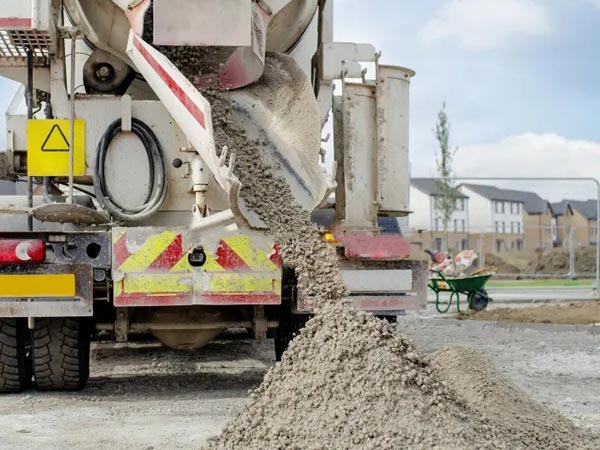If you are in the construction industry in Sri Lanka, you must be well aware of the limitations of using traditional concrete mixers: inaccurate manual batching, low efficiency, transport hassles, weather and terrain constraints ……

With Sri Lanka’s mountainous and islandous geography, tropical monsoon climate, fluctuating costs of building materials and stringent environmental policies, traditional mixers are no longer able to meet the demands of modern construction. The Aimix concrete mixer in Sri Lanka will not only solve your current problems, but also bring your project more than expected by reducing costs and increasing efficiency!
Status and Challenges of Concrete Mixers in Sri Lanka
Sri Lanka, being a developing country, is experiencing a period of growth in the construction sector (e.g., residential, infrastructure, roads, and real estate), resulting in strong demand for concrete. Demand for self-built houses in rural areas continues to rise due to population growth and accelerated urbanisation, while commercial developments are in full swing in cities such as Colombo and Galle. But at the same time, Sri Lanka’s geographical, climatic and economic environment puts higher demands on concrete mixing equipment, and the limitations of traditional mixers are becoming more and more obvious:


Geographic Dispersion: Concrete Transport Difficulties
Sri Lanka’s terrain is predominantly mountainous and hilly (the central plateau accounts for 2/3 of the country’s land area), with narrow and winding roads in rural and remote areas, making it difficult to transport large equipment. Conventional mixers rely on extra trucks to transport sand, gravel and cement, which is a small and time-consuming transport; during the rainy season, muddy roads will cause the equipment to travel, directly affecting the work schedule.
Humid and Rainy Climate: Equipment is Easily Damaged
Sri Lanka has a tropical monsoon climate, with humidity exceeding 80% throughout the year, and rainfall of up to 3,000mm during the rainy season. The metal casing of traditional mixers is prone to rust, and the electrical system is prone to short-circuiting due to humidity; in the event of heavy rainfall, concrete working in the open air is prone to clumping, leading to material wastage. In addition, power in some rural areas is unstable, and electric mixers are often shut down due to power outages, so contractors have to rent additional generators and costs skyrocket.
Economic Pressure: High Cost of Building Materials and Labour
Cement prices in Sri Lanka rose by 18 per cent year-on-year in 2024, and the price of sand and gravel fluctuated frequently due to import restrictions. Traditional mixers require 3-4 workers for loading, mixing and unloading, with labour costs accounting for up to 30%. To make matters worse, the labour shortage in the Sri Lankan construction industry has intensified, with skilled operators of traditional mixers becoming increasingly scarce, and the time and cost of training new workers further pushing up the total expenditure.
Efficiency Bottleneck: Low Mixing Efficiency
The productivity of traditional mixers is limited by manual labour and the performance of the equipment, with an average daily output of only 8-12 cubic metres. If the project requires a centralised supply of materials, traditional mixers are often “slow to supply”, resulting in a lack of concrete supply, which is forced to be purchased at a high price.
Aimix Concrete Mixers – Reducing Costs and Increasing Efficiency
In response to these challenges, Aimix concrete mixture machine in Sri Lanka is becoming the preferred choice of Sri Lankan builders, thanks to its 3 core strengths: integration, automation and adaptability.

Mobile on All Terrains: Mountains, Islands, Narrow Roads
The Aimix concrete mixer Sri Lanka has an “all-in-one vehicle design” and can be driven directly to the site without dismantling. Its compact body can easily negotiate the narrow roads of rural Sri Lanka. Diesel-driven, it is not dependent on stable electricity and can work efficiently in remote areas.
Automated Production: 1 Person Operating, Saving 4 Labourers
Our concrete mixer machine in Sri Lanka is equipped with an “intelligent weighing system” and a “one-button operation panel” (supporting 6 languages). And it will automatically complete the whole process of loading, weighing, mixing and discharging. While traditional mixers require 3-4 people to work together, Aimix concrete mixers require only 1 people.
Environmentally Friendly and Durable: Suitable for Sri Lanka’s Climate
The body of the Aimix concrete mixer for sale in Sri Lanka is coated with anti-corrosion coating and a double-layer paint process to prevent rust and corrosion. Critical wiring, such as the engine and electrical circuitry, is waterproof and dustproof, enabling stable operation even during the rainy season or in high-humidity environments.
Selection Guide: Traditional Concrete Mixer vs. Aimix Concrete Mixer
To help you make a more intuitive comparison, we show you the difference between our concrete mixers and most of the mixers on the market in terms of core performance, cost, adaptability and other dimensions:
 |
 |
 |
|---|---|---|
| Fixed or requires disassembly for transport | Mobility | Fully mobile—drives to site, no setup time |
| 3–4 workers (loading, mixing, unloading) | Labor Requirements | 1–2 workers (fully automated) |
| 5–15 m³/hour (limited by manual processes) | Production Efficiency | 7.2–26 m³/hour (consistent, high output) |
| High (human error in measuring) | Material Waste | Low (<2% error via smart weighing) |
| Extra trucks for sand/cement (₹5,000–₹10,000/day) | Transport Costs | No extra trucks—materials loaded directly |
| Poor for rough terrain or tight spaces | Adaptability | Compact design fits narrow village roads |
What is the Concrete Mixer Price in Sri Lanka?
With the above comparisons, you must have got a good idea about this concrete mixer. So how much does it cost? The concrete mixture machine price in Sri Lanka is affected by the capacity, brand and other factors. The concrete mixer we sell comes in various models, such as AS-1.8, AS-2.6, AS-3.5, AS-4.5, AS-5.5, AS-6.5, which correspond to a production capacity of 7.2, 10.4, 14, 18, 22, 26 cubic metres per hour, respectively.

In general, the concrete mixer machine price in Sri Lanka is around Rs. 3 million to Rs. 15 million. To avoid overcapacity, it is recommended that you choose AS-3.5, AS-4.5 small concrete mixer for small to medium sized projects in Sri Lanka. For large high-rise construction projects, choose AS-5.5 or AS-6.5.
Various Applications of Aimix Concrete Mixer in Sri Lanka
The Sri Lankan construction market is diverse, from rural self-builds to urban commercial complexes. Our concrete mixers with self-loading design (we also named it as self-loading concrete mixer) can help you solve the challenges of different projects through scenario adaptation:

Rural Self-Build Houses
- In Sri Lanka, the demand for rural self-build houses is soaring, but the roads in rural areas are narrow and transport is difficult. But Aimix self loading concrete mixers in Sri Lanka can be driven directly to the house site, and can be operated by 1 person. It can produce 20 cubic metres of concrete in one hour, shortening the duration of a single house by up to 10 days.
Small Infrastructure Projects
- The government’s Rural Development Programme promotes the construction of rural roads and community schools on tight schedules (typically 3-6 months) and on small sites. Our concrete mixer’s compact body allows for flexible turnaround on narrow roads, ensuring an uninterrupted supply of concrete, and increasing the on-time delivery rate of the project from 70% to 95%.
Mid-rise Commercial Buildings
- Mid-rise projects in Colombo, Galle and other cities require a high degree of concrete continuity. If the supply of material is interrupted, it may result in the structural strength of the concrete not being up to standard and requiring rework. Aimix cement mixer for sale in Sri Lanka has a output of 15-25 cubic metres per hour, and can supply material for more than 8 hours continuously. It can solve the “interrupted supply” of the traditional mixer completely.
Mountain Road Paving
- Sri Lanka’s mountainous areas are prone to rain and fog, and traditional mixers are prone to rust and short circuit; Aimix self loading concrete mixer’s anticorrosive body and sealed circuit design can still operate stably in the rainy season. Moreover, with four-wheel drive and engineering tyres, it can effectively prevent skidding and avoid accidents on muddy roads.
Why Choose Aimix? The Choice of 1000+ Customers
In Sri Lanka, choosing reliable concrete mixer suppliers can provide you with product quality assurance and a perfect service system. Aimix concrete mixer with 1000+ export quantity is a trustworthy partner.


No.1 brand in China exports
As the leading brand in the Chinese concrete machinery industry, Aimix has won the trust of global customers with reliable quality and innovative technology.
![]()
Wide coverage of international markets
Aimix products have been exported to more than 150 countries and regions, proving the wide applicability and international recognition of our products.
![]()
Global Subsidiaries and Service Locations
Aimix has 6 subsidiaries and more than 100 service locations around the world. Even without a direct subsidiary in Sri Lanka, we are still able to support and serve you through our network in other regions.
![]()
Fast Delivery
We promise to deliver the equipment immediately after the customer’s payment to ensure that you can receive the equipment quickly, reduce the waiting time and improve the construction efficiency.
![]()
High Quality After-sales Service
Aimix has a professional after-sales team to provide customers with technical support and service at any time to ensure the normal operation of the equipment.
Choosing an Aimix concrete mixer sale in Sri Lanka means choosing high quality, reliability and global support. No matter where you are, we can provide you with high-quality products and services.



